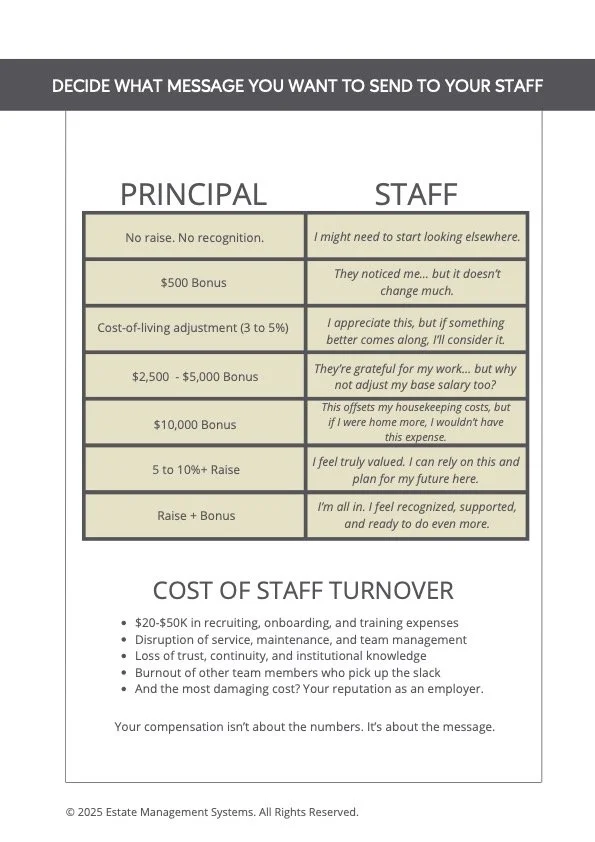What’s Fair and Sustainable in Private Service Compensation?
Ask yourself…
Would you take the job you’re offering?
Behind the gates of luxury households, one question is reshaping the conversation about estate staffing: Is your compensation structure fair, sustainable, and built to retain top talent?
Many private employers believe they’re being generous — paying top dollar to recruit top talent. But what happens when that generosity stops at the hiring phase? What message are you sending when there’s no structured path for growth, no retirement plan, and no annual performance review?
If your household feels like a revolving door, the problem likely isn’t your staff — it’s your system.
Why Private Service Often Gets Treated Differently
There’s a persistent myth in the world of luxury households: “This isn’t a corporation, it’s our home.” But if you’re expecting…
Corporate-level skills,
Military-grade precision, and
Concierge-style responsiveness…
…you can’t justify treating compensation and benefits like an afterthought.
Working in a private household is often more demanding than any corporate role. Staff are expected to be on-call 24/7, manage blurred personal boundaries, and anticipate needs with near-clairvoyant precision — all without the structure, support, or protections typically found in the corporate world.
You expect excellence. It’s time to lead with excellence, too.
Case Study: Amy, the House Manager
Three years ago, the Martins paid top dollar to bring her in as their house manager. She was competent, seasoned, and capable — and she delivered. Under Amy’s leadership, their home ran like a five-star resort.
Then things changed:
The Martins bought a second property; Amy managed both properties.
Her role expanded to include personal assistant duties, family logistics, and high-stakes travel planning.
She worked nights, weekends, and holidays — often at the expense of her own family and health.
When Amy finally asked for a raise, the Martins instead chose to give her a $10,000 bonus. On the surface, it sounded generous. But after taxes, it wasn’t nearly enough to cover the weekly housekeeping service she had to hire to maintain her own home — because her long hours left her unable to do it herself.
The raise didn’t reflect the value she brought. It reflected the bare minimum the Martins thought they could offer to keep her from leaving.
Raises don’t just cover expenses. They communicate respect and recognition. In this case, the message fell short.
Five Steps to Fair, Sustainable Compensation in Private Service
1. Decide What Kind of Employer You Want to Be
Do you want to be the employer staff tolerate — or the one they aspire to work for?
True unicorn employers build teams that last because they lead with clarity, fairness, and vision.
2. Benchmark Compensation
Don’t guess.
Ask a recruiter or private service consultant to help you evaluate current market data.
This isn’t about what the role paid five years ago. It’s about what the market demands now for the caliber of talent you expect.
3. Create a Tiered Compensation Structure
Include:
A strong base salary
Annual cost-of-living adjustments (COLA)
Merit-based raises
Bonuses tied to performance milestones
Milestone examples:
Completing your household manual
Successfully onboarding a new property
Improving service delivery systems
Be specific. Tie rewards to outcomes. Recognize achievements.
4. Offer Real Benefits
This means medical, retirement, family leave, PTO, and realistic travel per diems.
Remember:
If they manage your $20M estate, they should be able to afford their rent or mortgage, groceries, and childcare.
If they travel on your behalf, they should be able to afford a meal that reflects the environment they represent.
5. Invest in Career Longevity
Support professional development.
Pay for certifications, training, and opportunities for cross-training.
Help them build a career in your service, not just a job they might leave at any moment.
The True Cost of Turnover
Think a $10,000 bonus is expensive? Try losing your house manager. There’s no guarantee the next house manager will work out.
You may not trust them. Your staff may not like them. They may quit — or worse, they may quietly drive away your best people.
A weak compensation plan can become the silent cause of the very chaos you’re trying to avoid.
Final Thoughts
Compensation is more than a number.
It’s a signal — a powerful leadership message that says:
“We see you.”
“We value you.”
“We want you to stay.”
Raises aren’t handouts. They’ve earned recognition. And when thoughtfully structured, they inspire loyalty, excellence, and long-term stability.
So ask yourself:
Would you take the job you’re offering?
✅ Want to know if your compensation plan is competitive? Download the Private Service Compensation Checklist or book a consultation.
Let’s ensure your pay structure aligns with the performance you expect — and the loyalty you want to retain.


